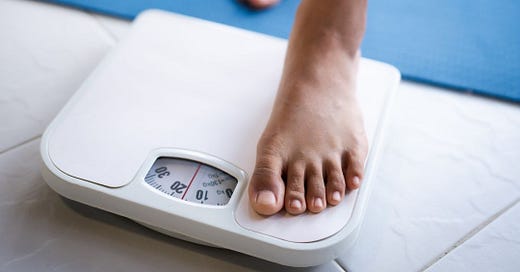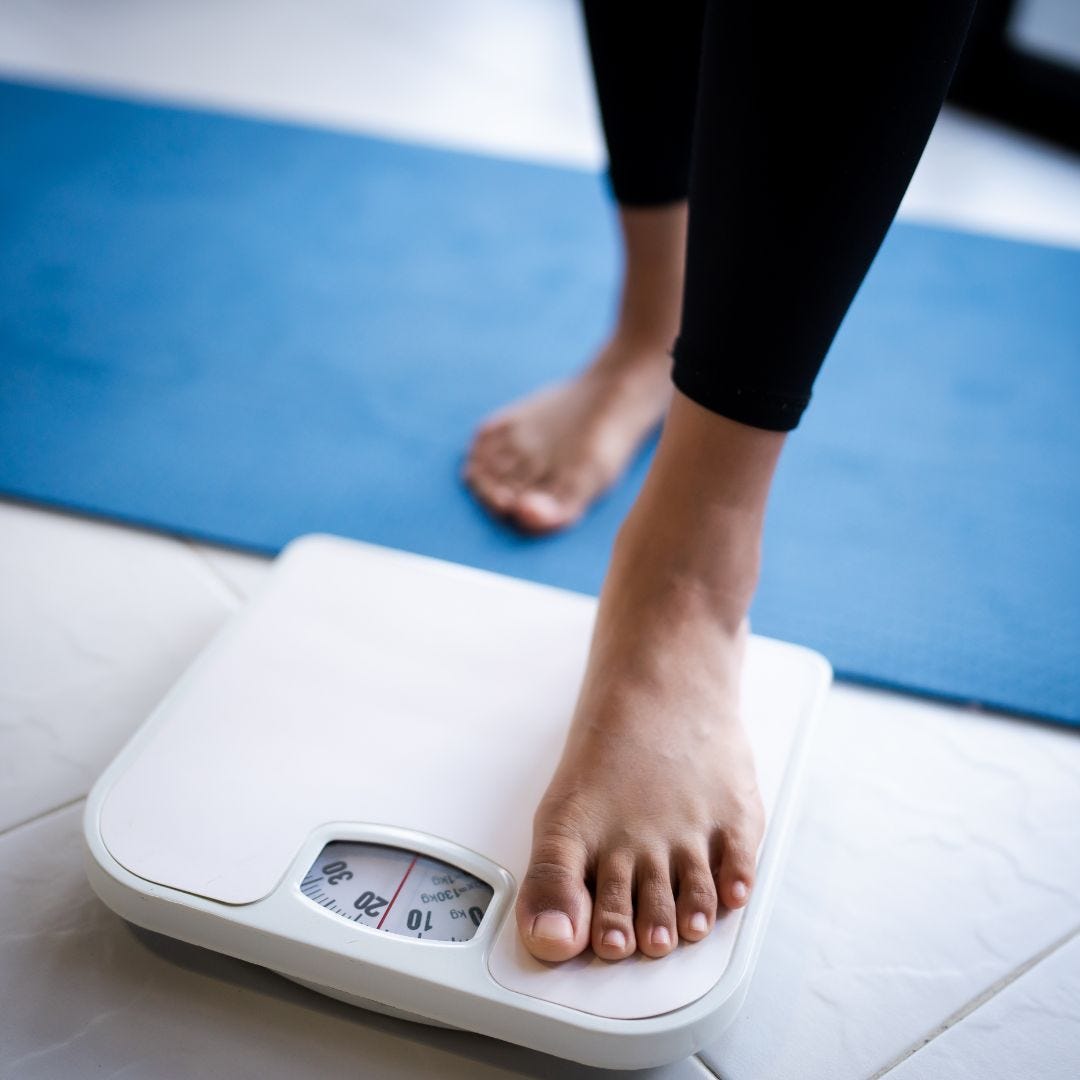If you’re new here—hello!
And if you’ve been fanning yourself with us for a while, you already know: HOT FLASH! The Newsletter is where we spotlight science you can actually use—real research on what works for women like us, no prescription pad (or permission) required.
Because let’s be honest: you shouldn’t have to wait for an appointment to start feeling like your best you.
Fresh off our May sleep focus, and with the arrival of summer, HOT FLASH! The Newsletter is ready to turn up the heat on a topic that touches many of us.
Including me.
Thanks to a little nudge (more on that in a moment), I’m inviting you to join me in pushing past the usual discomfort and shame to have some real talk around one of the most quietly frustrating shifts we face during peri- and postmenopause: changes in our weight.
So what was the nudge? It came while I was exploring studies for this month’s editions and stumbled upon a research initiative called ME-WEL, short for Menopause Weight Loss. As I dug into one of their first studies, I realized I couldn’t just summarize the findings and move on. There was more here—so much more, in fact, that I had to pause and reflect.
That’s when it hit me: this topic isn’t just about body changes—it’s about beliefs, identity, and the emotional weight we carry right alongside the physical.
That’s why I’m dedicating the whole month to more than just “weight talk.” We’re starting a new kind of conversation—one that replaces criticism with curiosity and restriction with reflection. In this edition, I’m stepping back from the research just a bit to ask: What does it really take to shift our relationship with weight during menopause?
Because before we dive into studies and stats, we need to make space for honesty, nuance, and real connection—with ourselves, and with one another.
And that conversation starts now.
Why Weight in Menopause Deserves a Different Conversation
From wellness trends to medical headlines to late-night Google spirals, we see the question how do I lose weight? everywhere. And, during peri- and postmenopause, for many of us, like our own bodies, this question shifts and changes into a more nuanced version of itself: how do I stop (or prevent) gaining weight?
And that shift deserves a conversation of its own. Here’s why:
First, menopausal weight gain is common and likely. It is estimated that around 60–70% of women will gain weight during the menopausal transition. It’s important for us to understand that this is not a sign of personal failure. It’s your body adjusting to hormonal changes that affect fat storage, muscle mass, appetite, and insulin sensitivity. Especially because...
Second, hormonal changes don't respond to the same old methods. The “eat less, move more” advice we’ve heard for decades just doesn’t work the same way when your body is experiencing shifts in estrogen, progesterone, and cortisol. Midlife weight requires a more compassionate, metabolically savvy approach.
Third, the implications are deeper. This isn’t just about body image—it’s about metabolic health, emotional wellbeing, and identity. Weight gain at this stage can increase the risk for cardiovascular issues, joint pain, and insulin resistance. At the same time, it can also affect how we mentally show up in our social (and sexual) lives. It can challenge how we see ourselves in a world that has long defined our worth by our appearance.
And finally, it can resurface old struggles. If you’ve had a complicated relationship with weight in the past—and let’s be real, according to the data, more than half of us have at one point or another—then menopausal weight gain can feel like reopening a wound. It can reactivate shame, fear, and frustration at a time when you’re already navigating major changes.
So yes, this is about weight. But it’s also about everything that weight brings with it: culture, control, care, and ultimately, the opportunity to reclaim how we support ourselves—inside and out.
Put simply, this isn’t just about how we look—it’s about how we live, how we feel, and how we see ourselves. It’s not just on the outside; it’s woven into our mindset, our metabolism, and our sense of identity.
That’s why the real goal during menopause can't be about shrinking our bodies—it needs to be about supporting our bodies, and also our minds. Supporting muscle. Supporting metabolism. Supporting cardiovascular and brain health. Supporting mindset and mentality.
If we are open to it, our weight can become not only a lens through which we see the bigger picture of our health but, more importantly, an opportunity to practice loving ourselves more—and more deeply—beyond who we are according to the scale.
And then came the ME-WEL Project...The Name vs The Conversation
Enter: the "ME-WEL (Menopause and Weight Loss): Development of Model, Measure, and Intervention" Project (name as found on funder website Portuguese Science and Technology Foundation).
Now, the name might suggest this project is all about a model, measure and intervention for menopausal weight loss.
But this is where I found a multi-layered irony worthy of conversation as well.
I mean, sure, on the surface, I get it. Using “weight loss” in the title probably makes it more recognizable, clickable, and maybe even fundable. I’ll admit it—I used it for this month’s WELLshop because I know it’s the kind of language that catches people’s attention.
(🤷🏽♀️Hey, sometimes, you put a flashy sign on the front door just to get folks to walk in—then once they’re inside, you gently lead them to a whole different room they didn’t even know they needed to see.)
But here’s the difference: that kind of strategy makes sense for a workshop. In research? Especially research that’s trying to shift the narrative? It should reflect the depth and nuance of what it’s actually studying. And in this case, the title doesn’t just open the door—it sets the tone for everything that follows. Sure, researchers love a good acronym (ME-WEL does work ‘well’), but the name still matters—and so does the message it sends.
Because while ME-WEL's title centers loss, its actual intent is far more nuanced. It's about exploring beliefs, emotional patterns, and broader psychological and social factors and how they influence weight-related behavior and outcomes during the menopausal transition.
That’s why the name feels ironic. The use of “weight loss” in the title seems to subtly reinforce the very cultural messaging the research is investigating: that weight loss is the goal, the norm, the expectation. That language isn’t neutral—it’s loaded. Especially when shifting the narrative—from “fixing” our changing bodies to understanding and supporting them—is what helps shift the outcomes.
It feels a bit like studying diet culture in the hopes of reducing its negative impact while simultaneously naming your project after one of its most harmful messages. When the thing you’re trying to investigate is also the thing you’re centering in your title, especially when that thing is shaped by decades of toxic messaging, it sends a confusing signal. The name ends up reinforcing norms the research could be questioning.
Because while ME-WEL pushes boundaries by examining the psychological and emotional terrain of midlife weight changes, its title defaults to the same framing that’s shaped so many of our questionable internal beliefs: i.e. that thinner is better, and that loss is the only direction worth measuring. This feels like a missed chance to truly shift the conversation.
Still, I’m genuinely encouraged by the substance of the work. ME-WEL’s focus on mindset—how our beliefs about weight shape behaviors and outcomes—is exactly the kind of conversation we need more of. And since mindset is our jam at Changing with the Change, you know we’re all in. (If you would like to explore more about the Changing with the Change program for groups or individuals, visit https://embodywell.com/cwc.)
While I hope future research efforts like this choose language that broadens the conversation rather than limits it, there is definitely much to explore in ME-WEL’s individual studies this month. Because when you look past the title, the studies themselves offer a lot of depth and direction—especially around mindset, belief, and behavior change.
And we'll start next week by featuring one of the ME-WEL articles in our usual HOT FLASH! The Newsletter fashion: summarizing conclusions and key findings for you, and suggesting ways you can use the research to support your own evolving story around weight, identity and health in midlife.
Your Invitation to the Conversation
At Changing with the Change, we believe real empowerment begins when we get real with ourselves—when we examine what we believe, what we’ve been taught to believe, and what we want to carry forward. And, honestly, nothing brings up identity, culture, and emotion quite like that number on the scale.
So let’s do that. I invite us all to examine our own beliefs—about weight gain, about weight loss, and about the strategies we’ve used or abandoned along the way. And let’s start identifying what (and who) truly supports us—mentally, metabolically, and emotionally—not just what shrinks us.
NOTE TO SELF: This is hard stuff. Unlearning takes time. Adjusting and adapting is a constant journey. I gained 15 pounds in a month during my first postmenopause year. Most of my clothes still fit (thank goodness for spandex!)—but they fit differently. And now, dating in my 50s, I sometimes still hear that voice from decades ago—my ex in my 20s, half-joking (or maybe not?), telling me that if I "got a belly," he’d leave. That kind of messaging sticks. But saying it aloud actually helps. Writing it for all to see even more. And deciding that it no longer defines me? That’s where I know the power begins.
And here’s more good news: the more we practice (at turning inward and quieting the outside noise), the more resilient we become. And as many of us know firsthand—one of the real gifts of aging is that we start to give a f*ck a lot less about the wrong things...and start caring more about and focusing on what truly matters.
Want to join the conversation?
Join us mid-month for our June HOT FLASH! LIVE! Thursday June 19th at 8PM ET where I will share my story as I examine my own beliefs and explore reframes around my weight and identity.
If you would like to join the conversation LIVE and share your story, send an email to me at tanya@embodywell.com!)
Then later in the month, register (see below) for the infamous(LOL!) EmBODY WELLshop where we'll reframe "weight loss" together as we explore actionable, sustainable evidence-based lifestyle strategies.
🗓️ Saturday, June 28 at 2PM ET
🎯 “Weight Loss, Waist Loss and What Works”
Register here →
📬 Drop us a line to let us know: Are you ready to examine your beliefs when it comes to weight and menopause? If so, where will you start? If not, that’s okay. We’re all on our own timelines. And maybe ask yourself: What’s keeping me from getting curious? There’s power in just noticing that. Because sometimes, when we allow a little curiosity in, we uncover a new kind of clarity—and compassion—for ourselves.
We’d love to hear from you.
Stay tuned for next week’s dive into the ME-WEL study on weight-related beliefs and behaviors in peri-and postmenopause—and what it means for your next chapter.







